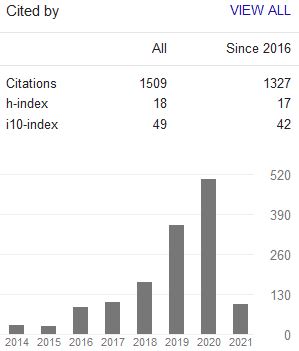THE POLITICAL DIMENSION OF INDONESIAN ISLAMIC EDUCATION IN THE POST-1998 REFORM PERIOD
Abstract
Keywords
Full Text:
PDFReferences
Ananda, A. “Esensi Pendidikan Kewarganegaraan: Sebuah Kilas Balik Pendidikan Kewarganegaraan di Indonesia”. Demokrasi, vol. IV, no. 1: pp. 38-49.
Brighouse, H. Tooley, J. and Howe, K. R. Educational Equality. 2nd Ed. New York, NY: Continuum International Publishing Group, 2010.
Bruinessen, M. V. “Pesantren and Kitab Kuning: Continuity and Change in a Tradition of Religious learning”, in: Wolfgang Marschall (ed.), Texts from the Islands: Oral and Written Traditions of Indonesia and the Malay World. Berne: The University of Berne Institute of Ethnology: 1994.
Fachrudin, Y. Working Paper: Corak Pendidikan Agama Islam pada Madrasah dan Sekolah. Jakarta: UIN Syarif Hidayatullah, 2014.
Giroux, H. A. Border Crossings: Cultural Workers and the Politics of Education. 2nd Ed. New York, NY: Routledge, 2005.
General Directorate of Higher Education. Pendidikan Anti Korupsi, june 5th, 2012. Retrieved at http://dikti.go.id/id/2012/06/05/pendidikan-anti-korupsi/
Geertz, C. “The Javanese Kijaji: The Changing Role of a Cultural Broker”. Comparative Studies in Society and History, vol. 2, no. 2. Cambridge University Press: Jan., 1960.
Government of the Republic of Indonesia. Undang-Undang Republik Indonesia Nomor 20 Tahun 2003 Tentang Sistem Pendidikan Nasional. Jakarta: 2003.
----------. Undang-Undang Republik Indonesia Nomor 2 Tahun 1989 Tentang Sistem Pendidikan Nasional. Jakarta: 1989.
Hefner, R. W. Making Modern Muslims: The Politics of Islamic Education in Southeast Asia. Honolulu: University of Hawaii Press, 2009.
Idris, M. “Pembaruan Pendidikan Islam dalam Konteks Pendidikan Nasional.” Lentera Pendidikan, vol.12, no. 1 (June 2009).
Kirst, M.W. “An EEPA Interview with Michael W. Kirst” Educational Evaluation and Policy Analysis, vol. 2, no. 1 (Jan. - Feb., 1980).
Mansyur, M. H. “Kebijakan Pemerintah Tentang Pendidikan Islam.” Solusi, vol. 10, no. 22 (March 2012).
Shabir, M. “Kebijakan Pemerintah dan Pengaruhnya Terhadap Pendidikan Islam di Indonesia.” Lentera Pendidikan, vol. 16, no. 2 (December 2013).
Whitty, G. Making Sense of Education Policy. London: Paul Chapman Publishing Ltd, 2002.
Zajda, J. – Geo-JaJa, M. A. The Politics of Education Reforms. New York, NY: Springer Dordrecht Heidelberg London New York, 2010.
DOI: 10.15642/JIIS.2014.8.2.284-298
Refbacks
- There are currently no refbacks.
Indexed by:
Journal of Indonesian Islam (ISSN 1978-6301 and E-ISSN 2355-6994) is published by the Postgraduate Program (PPs) and the Institute for the Study of Religion and Society (LSAS), State Islamic University (UIN) of Sunan Ampel Surabaya.
Journal of Indonesian Islam by http://jiis.uinsby.ac.id/index.php/JIIs/index is licensed under a Creative Commons Attribution-ShareAlike 4.0 International License.
Copyright ©2020 State Islamic University (UIN) of Sunan Ampel Surabaya. Powered by Public Knowledge Project OJS.







